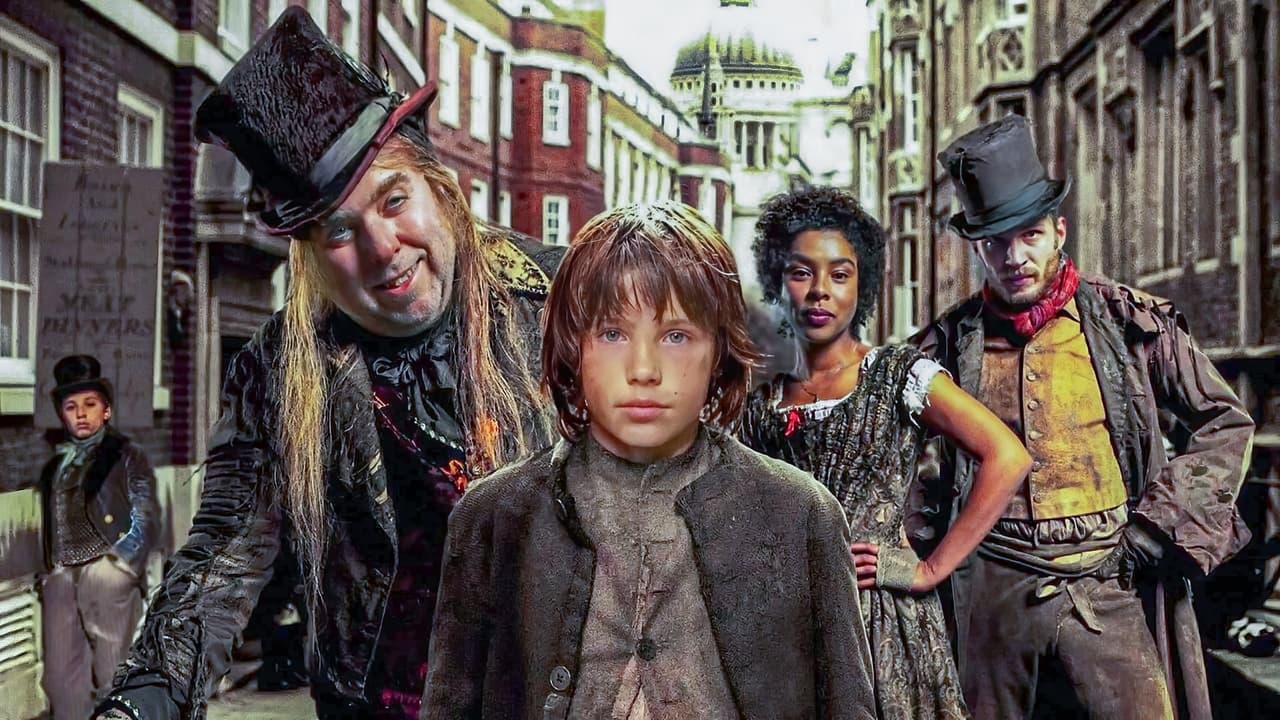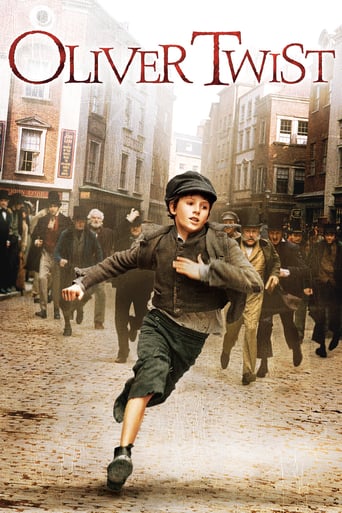

i know i wasted 90 mins of my life.
... View MoreDreadfully Boring
... View MoreI think this is a new genre that they're all sort of working their way through it and haven't got all the kinks worked out yet but it's a genre that works for me.
... View MoreGreat story, amazing characters, superb action, enthralling cinematography. Yes, this is something I am glad I spent money on.
... View MoreOliver Twist, an orphan in Victorian times, runs away to London to seek his fortune, where he falls in with a gang of pickpockets led by the crooked Fagin. Oliver is caught by the police but rescued by Mr Brownlow, a kindly old man who takes pity on him, but Fagin and his cronies are keen to have Oliver back ...This adaptation of the beloved classic novel by Charles Dickens is a solid, entertaining picture throughout - well made, well acted, evocative and atmospheric. The dirty squalor of the backstreets Oliver finds himself trapped in are both beautiful and horrible, and the movie presents Victorian society realistically without over-emphasising the injustice and poverty. Best of all, it grasps the tone of the characters and their relationships just right; Oliver's warm-hearted pity for Fagin, Sykes' vicious distrust of everyone, Nancy's forlorn hope for a better life. Polanski exploits each character flaw and confrontational scene for maximum dramatic effect, but does so unobtrusively and quietly, giving the film a sense of tenderness amidst the harsh realities. The entire cast are excellent, with Kingsley and Foreman in the flashy key roles, but I particularly like Strong as the foppish accomplice, Toby Crackit. Perhaps most importantly for a period piece Polanski uses people who look the part; veteran British actress Liz Smith, who plays the old woman who rescues Oliver on the road, conveys more depth in one scene with just her face than some TV actors do in an entire career. There's nothing to criticise in this fine drama, except possibly the need for a new version of this story, since both the 1948 black-and-white David Lean version and the 1968 Lionel Bart musical version are outstanding (there are also at least five TV movie/miniseries adaptations). Polanski was well qualified to make it, given the horrors of his own childhood in the Krakow Ghetto, but if nothing else it's a terrific adaptation of a nineteenth-century classic for a twenty-first century audience. A British-Czech-French coproduction, shot in Prague and featuring a lovely string score by Rachel Portman.
... View MoreWhen you have read classic novel like Oliver Twist in your childhood , the excitement pumps up in your vein to watch the movie which is directed by none other Roman Polanski. Oliver Twist delivers and delivers very well.Based on classic novel by Charles Dickens, Oliver Twist describes the story of an orphan who lands up in bad company of a cruel and cunning , Fagin( played brilliantly by Ben Kingsley) where he learns to steal for living. From the director of Chinatown , The Pianist and The Ghostwriter to name few , Roman Polanski brings you another classic movie which will be remembered for its stupendous director , excellent cinematography and wonderful art direction. The director succeeds in describing each character with humor and appropriate details like their accent ( mostly British as it was set in London), personality. Polanski will take you to the fascinating world of old London with charm of its own and you will feel like reading the actual novel. The screenplay tends to loose in the later reel though. Ben Kingsley steals the show with his fantastic portrayal of selfish Fagin. Rest of the star cast did justice to their part.Overall , Oliver Twist stays true its content as in the novel. Very Good 4/5
... View MoreThe movie "Oliver Twist" by Roman Polski, based on the book "Oliver Twist" by Mark Twain is about the little orphan Oliver Twist. He used to grow up in an orphanage but after he obeyed the rules, he gets sold to a businessman. After he escapes from there he goes to London where he meets Fagin and his gang and they take care of him. But there are thief's and as Oliver realizes that, he tries got get away of them and an exciting hunting begins... The general setting of the movie is quite good, i guess England at that time looked nearly the same like it does in this movie. The actors are very good too, even if some of them are a bit confusing (e.g. Fagin, I still don't know whether he is a good one or not.). But some of the scenes don't really make sense, you don't get enough background information, such as the scene with the old lady on his way to London or the scene at the beginning (it's an open beginning). The ending of the movie is sad and happy and the same time. On the one hand it's good that he is save now, on the other hand it's sad that Fagin has got to die. I never read the book before, so I can't say whether it's a good movie compared to the book. I had to watch the movie in English Class and I really enjoyed it. Even for people that have English as the second language it is easy to understand. If it's all about the question "Is it a movie for every age?" I can say that it is not a movie for little kids, like under 12 years, because it contains a bit of violence, but for older people, its suitable. I could even imagine watching this movie with my parents, I think they would enjoy it too, so it's a movie for the hole family, if your kids are older than twelve ;-)
... View MoreI borrowed the DVD of this movie and put it on with great anticipation, only to feel disappointed halfway thru viewing. London is depicted nothing like Dickens described it, chaotic and dingy. Here the buildings are simply "Hollywoodish" and artificial. Oliver comes across as expressionless and emotionless at the best of times, and he is too clean for a workhouse orphan cum street child. Ditto with the gang of boy thieves under Fagin's employ, they come across as just brats with all swagger and no bravado. Bill Sikes is too wooden and for me, not violent or sadistic enough to scare a ghost. He seems to be hesitating in scenes where he is supposed to be really physical, e.g., hitting Nancy, like he seems to contemplate briefly whether he should go thru the action or not. And I find it hard to swallow the fact that in the final third of the movie, Fagin and his boys would just hang out in a warehouse in resolute acceptance of their eventual fate, instead of planning an escape from police, if they were "proper" criminals. Roman Polanski is a great director and I have great admiration for his works, but this one is a complete letdown.
... View More